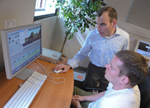6 A&S Physicists Awarded Breakthrough Prize
Our universe is dominated by matter and contains hardly any antimatter, a notion which still perplexes top scientists researching at CERN’s Large Hadron Collider. The Big Bang created equal amounts of matter and antimatter, but now nearly everything—solid, liquid, gas or plasma—is…


 Alan Foley, associate professor in instructional design, development and evaluation, leads the team of researchers that secured the grant. Their individual research projects–in areas including science education, teacher education, instructional technology, linguistics, and communication and rhetorical studies–each pursue questions that necessitate the collection and analysis of large quantities of digital video (DV) data.
Alan Foley, associate professor in instructional design, development and evaluation, leads the team of researchers that secured the grant. Their individual research projects–in areas including science education, teacher education, instructional technology, linguistics, and communication and rhetorical studies–each pursue questions that necessitate the collection and analysis of large quantities of digital video (DV) data.